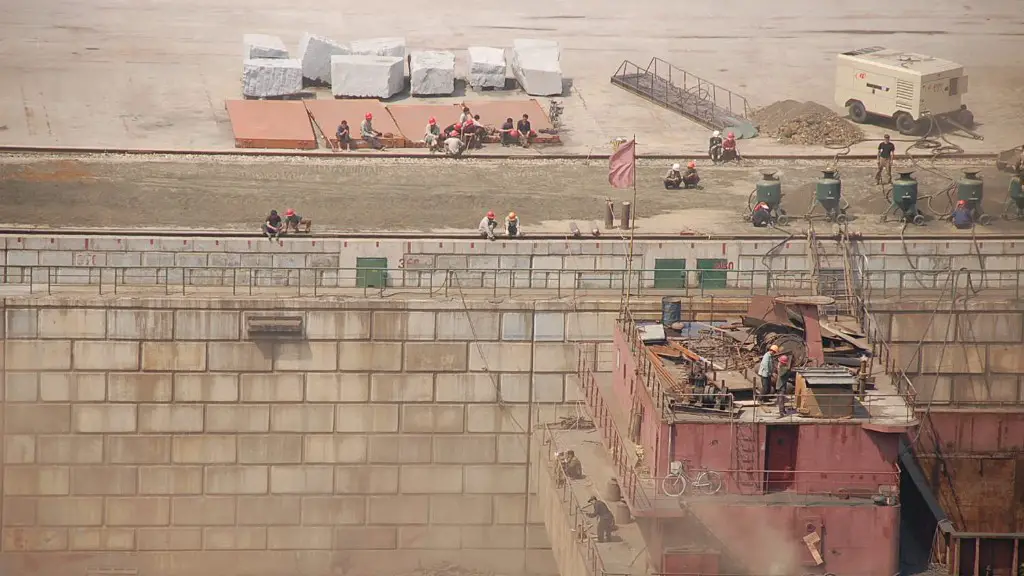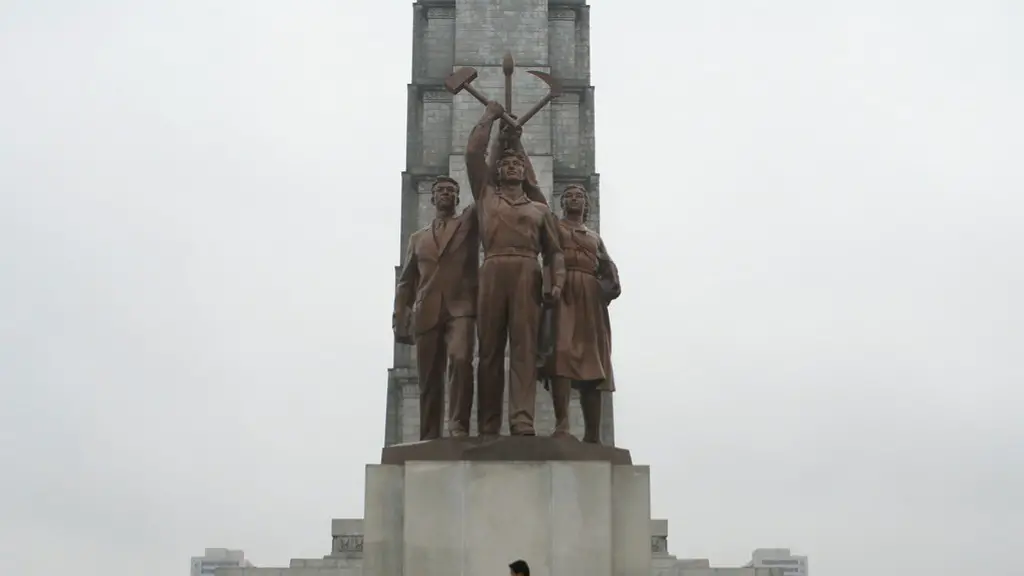The debate regarding North Korea is constantly in the public eye, with the nation standing at a highly precarious crossroads. As such, the question of whether or not it is ‘suicidal’ has been one which has been asked for many years and has attracted discerning levels of attention. In this article, we will investigate this further, exploring the idea of North Korea being a suicide state and analyzing this from the perspectives of the international community, the people of North Korea, and finally, independent experts.
The International Perspective
From the perspective of the international community, North Korea is considered to be an extremely dangerous state. From its narrative of nuclear proliferation to its community outreach and potential for conventional warfare, many within global society have begun to feel alarmingly uneasy at the state of the nation. This uneasiness is firmly centered around the idea that the North Korean government is willing to incinerate the entire nation in a mass display of suicide, in pursuance of its political and ideological aims.
Furthermore, there is considerable evidence that North Korea is indeed willing to take extreme action in order to ensure that its nationalistic and ideological projects are fulfilled. This willingness to take risks often involves the usage of nuclear weapons, as demonstrated by its continued uranium enrichment program. These weapons are seen by world leaders to be tantamount to an act of suicide—whereby if nuclear arms were used, the entire nation could be wiped out in a heartbeat.
The North Korean People
When looking at the question of North Korea being a suicide state from the perspective of the people, things become far more nuanced. From a nationalistic point of view, many North Koreans are fiercely loyal to their government and this has been reflected in their continuous support of the state. This loyalty is often seen as a testament to the country’s ideology and is aimed at demonstrating the inarguable value of the North Korean people.
At the same time, however, there is considerable evidence to suggest that the North Korean government is highly oppressive, and that there is an underlying desire to put an end to their nation’s woes. This, in turn, has created an atmosphere of desperation amongst many of the nation’s citizens—something which has been further compounded by the state’s wild and ever-escalating threats of nuclear warfare.
Expert Perspectives
When it comes to the question of whether or not North Korea is a suicide state, many experts have painted a rather grim picture. These experts have suggested that the current state of affairs in the nation is incredibly dangerous, citing the extreme poverty and levels of violence in the nation as signifiers of a significant level of internal unrest. They have also suggested that, given the country’s apparent willingness to risk using nuclear weapons, it is conceivable that North Korea could be regarded as a suicide state.
At the same time, however, experts have suggested that North Korea can still be saved if proper diplomatic solutions are implemented. Furthermore, they have suggested that the nation itself has the potential to turn things around and achieve a level of inner-stability that would allow it to become a prosperous and successful nation. All of this, of course, depends upon the nation’s leaders and its citizens recognizing the need for change and making a concerted effort to bring it about.
The Economy
Another important element to consider when assessing the question of whether North Korea is a suicide state lies in the nation’s economy. This element is particularly prominent when discussing the impact of global sanctions, which have been imposed in an attempt to limit the nation’s ability to finance its nuclear armaments program. Whilst powerful, these sanctions have had a significant negative impact on the economy of the nation, leading to an increase in poverty and economic instability.
As such, it is prudent to assume that if the sanctions are not lifted or alleviated, the economic outlook for North Korea will become increasingly bleaker. This could, in turn, lead to an increase in violence and unrest in the nation—both of which could eventually contribute to the downfall of North Korea as a nation.
International Relations
The relationship between North Korea and the international community is one which is often fraught with tension and animosity. This is especially prominent in relation to the question of whether or not North Korea is a suicide state. Many within the international community view the nation’s threat of using nuclear weapons as a sign of suicide mentality—and as such, relations between the two sides have become increasingly hostile in recent years.
Whilst world leaders have attempted to implement diplomatic solutions to the situation, it has often been the case that the North Korean government has refused to cooperate—choosing instead to blame the international community for the nation’s current ills. This lack of cooperation, along with North Korea’s continued nuclear proliferation and belligerent rhetoric, has resulted in a deteriorating relationship between North Korea and the international community—something which could eventually tip the scale towards a state of volatile international relations.
Military Activity
Finally, when looking into the question of whether or not North Korea is a suicide state, it is important to consider the nation’s military activity. Relatively speaking, North Korea’s conventional military capabilities are quite limited—and yet, it has been reported that the nation has been actively preparing for war. This activity has largely involved the stockpiling of weapons and upkeep of its military personnel, and whilst this does not necessarily translate to an immediate threat to international security, it nevertheless serves as yet another sign of the nation’s escalating level of preparedness.
It is this level of military preparedness, coupled with North Korea’s nuclear capabilities, which suggests to many experts that North Korea may in fact be suicidal in its behaviour. This, however, highlights the need for further actions to be taken by both North Korean and international actors in order to ensure that the potentially disastrous consequences of this state of affairs are prevented.
Cultural and Historical Context
When assessing the question of North Korea being a suicide state, it is important to consider the nation’s cultural and historical context. North Korea’s narrative has been heavily shaped by a series of wars and invasions, culminating in the Japanese occupation of the nation from 1910-1945. However, it is the period of the Korean War which has had the biggest effect on the nation’s cultural mindset—with many North Koreans viewing the nation’s current state of affairs as one which was precipitated by the decimation of their nation during the conflict.
As such, the idea of North Korea being a suicide state can also be considered from the perspective of the nation’s citizens—with many of them potentially having an intense and emotional connection to the narrative of the war. Although this may not necessarily translate to actual suicide on the part of North Korea, it can be argued that this narrative has played a large part in informing the nation’s current behaviour, and in embodying the strong sense of national identity that is so prevalent in North Korean society.
Domestic Politics
The role that domestic politics have played in formulating North Korea’s current state of being is also something which is worthy of consideration. North Korea is a nation which officially follows a single-party system of governance—with the Korean Workers’ Party (KWP) being firmly in control of the nation’s political processes. This single-party system has undoubtedly played a large part in influencing the nation’s narrative and ideological beliefs, which in turn contributes to the nation’s perception of itself—both within the nation and beyond.
Furthermore, the top-down approach of the KWP has ensured that the nation’s citizens have been almost completely precluded from influencing the nation’s direction. As such, it can be argued that the majority of citizens do not actually have a voice in determining the nation’s national direction, making the idea of North Korea being a suicide state all the more daunting.
Propaganda and Private Life
The use of propaganda has also been an important factor in shaping the nation’s narrative and has arguably led to a situation where citizens are compelled to abide by the nation’s state-sanctioned behaviour. From the perspective of its citizens, North Korea’s use of propaganda has served to further stress the importance of loyalty to the nation—particularly in relation to the gradual militarization of the nation.
At the same time, however, the use of propaganda has also served to limit the amount of freedom citizens have in their private life. This has resulted in citizens having to hide their true beliefs and expressions from the authorities—otherwise risk facing severe penalties and persecution. This, in turn, has served to further strengthen the view that North Korea is a highly oppressive nation, one which is willing to go to extreme lengths to protect its political standings.
North Korean Ideology
When looking at this question from an ideological point of view, North Korean leaders have sought to demonstrate their commitment to their nation as part of their continued efforts to preserve the nation’s ideological foundations. This has been especially evident during the nation’s push for nuclear armament—with many political leaders proclaiming the importance of nuclear power in protecting the nation from external threats. Whilst this reasoning has been fiercely debated, the underlying sentiment of protecting the nation from enemy forces through nuclear armament has been a consistent theme in North Korean political rhetoric.
This idea of self-preservation through nuclear power has been further bolstered by the government’s continued focus on domestic production, with the aim of creating an internal system of goods and services that can prop up the nation’s economy. This has led to the nation’s ongoing focus on producing nuclear armaments, which suggests that the North Korean leadership is willing to risk the destruction of the nation in order to protect its own interests.
International Relationships
Finally, it is worth noting that North Korea has developed a number of international relationships in recent years—relationships which it has been leveraging to further its own aims. This has been especially prominent in its relationships with neighboring states such as China and Russia—with both nations providing economic and political support to North Korea. At the same time, North Korea has also developed relationships with countries such as the United States, albeit not as warmly as with its other two allies.
Whilst these international relationships can be seen as a boon for the nation, it is also noteworthy that these nations are to varying degrees willing to offer military support to North Korea—support which could be employed to devastating effect during a conflict situation. As such, it can be argued that North Korea’s alliance with other powerful nations and its apparent willingness to call upon these resources could indeed be seen as another indicator of the nation’s suicidal mentality.




